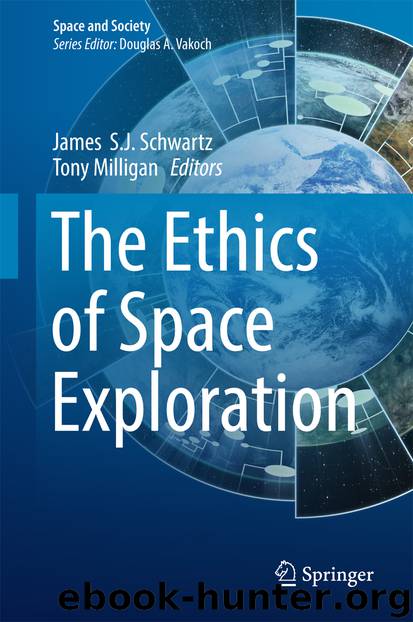The Ethics of Space Exploration by James S.J. Schwartz & Tony Milligan

Author:James S.J. Schwartz & Tony Milligan
Language: eng
Format: epub
Publisher: Springer International Publishing, Cham
10.2 Children of the Stars: Being in Space
Before accessing the topic of space migration , we shall start our reflection by asking the question: “should we go to space?”. A common answer given to this question is that humans should first take care of the problems characterizing planet Earth, before going somewhere else.4 The counter-argument to this point has been mostly utilitarian, that is: we will never go to space, if we wait until we resolve all the problems on Earth. Or, alternatively: we will resolve problems on Earth by going to space and finding new resources. Instead of an utilitarian view based on a linear progression of time, which has been criticized both from a scientific (Gould 1996) as well as from a philosophical perspective (especially, within the post-modern frame), we will approach this subject from an onto-epistemological standpoint inspired by Heidegger’s definition of technology (1953; Engl. Trad. 1977); space will be thus accessed as “a way of revealing” (ivi, 12), allowing for an original understanding of the notion of space. Let’s start with the problematics related to our initial question by asserting a basic and still informative point: we have always been in space. Humans have originated on planet Earth, which is part of a solar system located, among many others, in the Milky Way galaxy. Asking if we should go to space, more than looking for a real answer, reflects the human-centric dualistic attitude of presenting the unknown as a form of separated otherness. A more precise question could then be: “should humans migrate to outer space?”. The term “outer space” is defined by the Oxford Dictionary as “the region of space beyond the earth’s atmosphere or beyond the solar system. In extended use: a place or region beyond the usual limits of awareness or accessibility” (2015). It can be seen as an extended and somehow confused framework, comprehensive of a wide variety of spaces, such as the solar system as well as the regions beyond the solar system. The notion of “outer space” implies the one of “inner space”, which would be the Earth and the earth’s atmosphere: these dualistic premises become disputable when realizing that outer space is crucial to the understanding of life on Earth and to the development of the notion of the human itself.
From the origin of human civilizations to the contemporary world, the skies have played a crucial role in the formation of human identity. Astronomy5 is considered the oldest of natural sciences, dating back to the Upper Paleolithic (cf. Brady 2013); its relevance to many ancient cultures went so far as becoming focal part of their social identity and architectonical outfits.6 The large majorities of the temples across world civilizations were built in accordance with astronomical alignments: think, for instance, of the solstitial orientation of the sarsen monument at Stonehenge (Ruggles 2006) or the early Maya urban planning architectural complexes (Šprajc et al. 2009). The connection between knowledge of the skies and the sacred were deeply intertwined, and it is
Download
This site does not store any files on its server. We only index and link to content provided by other sites. Please contact the content providers to delete copyright contents if any and email us, we'll remove relevant links or contents immediately.
Man-made Catastrophes and Risk Information Concealment by Dmitry Chernov & Didier Sornette(4735)
The Revenge of Geography: What the Map Tells Us About Coming Conflicts and the Battle Against Fate by Kaplan Robert D(3597)
Zero Waste Home by Bea Johnson(3288)
COSMOS by Carl Sagan(2950)
In a Sunburned Country by Bill Bryson(2946)
Good by S. Walden(2914)
The Fate of Rome: Climate, Disease, and the End of an Empire (The Princeton History of the Ancient World) by Kyle Harper(2436)
Camino Island by John Grisham(2383)
A Wilder Time by William E. Glassley(2362)
Organic Mushroom Farming and Mycoremediation by Tradd Cotter(2307)
Human Dynamics Research in Smart and Connected Communities by Shih-Lung Shaw & Daniel Sui(2177)
The Ogre by Doug Scott(2114)
Energy Myths and Realities by Vaclav Smil(2060)
The Traveler's Gift by Andy Andrews(2011)
Inside the Middle East by Avi Melamed(1939)
Birds of New Guinea by Pratt Thane K.; Beehler Bruce M.; Anderton John C(1906)
Ultimate Navigation Manual by Lyle Brotherton(1767)
A History of Warfare by John Keegan(1713)
And the Band Played On by Randy Shilts(1615)
